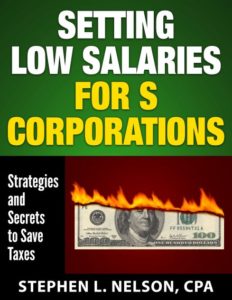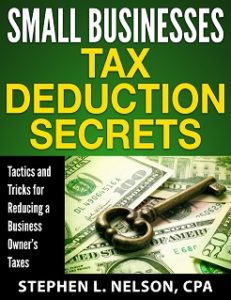
A client came into the office the other day and mentioned she had heard one can’t use an S corporation for a one person business or for a husband and wife business.
This is a great subject for a post—and the perfect time of the year to have a discussion. So I want to talk about whether one-person S corporations work.
Background: How S Corporations Save Tax
Just to first put us all on the same page, though, let’s make sure you know how an S corporation saves a business owner taxes. I’m going to use rough numbers.
If you operate a sole proprietorship or are a partner in a partnership and you make $100,000, you pay both income taxes and self-employment taxes (Social Security and Medicare) on the $100,000.
You might pay about $15,000 in income taxes on the $100,000 for example.
And then, in addition to that, you would also pay a 15.3% self-employment tax. The formula gets a little complicated, but this would work out to about $13,000 in the case with $100,000 in business profits.
Now that you know this, here’s the S corporation trick. If you incorporate the business, the S corporation tax return lets you split your $100,000 into two categories: wages and distributive share. And the thing is, only the wages are subject to the 15.3% employment tax.
If the $100,000 of profit, for example, gets split into $40,000 of wages and $60,000 of distributive share, the 15.3% employment tax (Social Security and Medicare) applies only to the $40,000 of wages. That equals roughly $6,000 obviously.
Compared to an unincorporated business, the S corporation option saves about $7,000 a year in payroll taxes.
Note, by the way, that because you pay income taxes on both the wages and the distributive share, your income tax bill should basically remain unchanged as a result of an S corporation election. If you paid, say, $15,000 income taxes before the S corporation, you’ll pay $15,000 after the S election.
Some People Think One-person S Corporations Are Illegal
You can see pretty clearly how artificial the S corporation accounting gets, right?
And in a sense, you can understand why many people, including some CPAs and many people at the Internal Revenue Service, think this whole S corporation thing doesn’t work. Or at least shouldn’t work. Especially if someone has simply “incorporated” a job or a partnership interest.
 Tip: If you’re unsure about how low you can set an S corporation shareholder’s salary, you need to do more research and analysis.
Tip: If you’re unsure about how low you can set an S corporation shareholder’s salary, you need to do more research and analysis.
If you are still in the process of doing this research, consider acquiring our “Setting Low Salaries for S Corporations” e-book. The downloadable resource comes with a money-back guarantee…
Why One-person S Corporations Are Legal
But here’s the thing we all need to acknowledge about tax law: Congress makes the laws.
And that’s why I say the S corporation option works for small businesses—including the one-person S corporation. But let me explain my logic.
In the summer of 2010, the House of Representatives attempted to fix (sort of) the one-person or two-person S corporation loophole by passing the “American Jobs and Closing Tax Loopholes Act of 2010.”
In a nutshell, this piece of legislation disqualified most “white collar” and “professional” small businesses from saving employment taxes with S corporation.
If you want to get more details about the legislation, you can refer here. But the main thing to note is that the “American Jobs and Closing Tax Loopholes Act of 2010” would have meant that some S corporations with three or fewer shareholder-employees couldn’t play the S corporation accounting game.
In other words, the “Closing Loopholes” act was all about preventing some (again though, some and not all) one, two and three owner S corporations from saving employment taxes.
After the legislation passed in the house, the Senate attempted to pass its own version of the proposal, but Senate Republicans and centrist Democrats shut down the process.
I’m not sure that we know exactly why the Senate in effect killed the legislation. But, probably, the Senate at least partly killed the proposal because it was so patently unfair to close the loophole for some very small S corporations but not for others.
I’m not going to get into that debate here, however, because what I think we want to take away from this whole process is rather more basic.
Congress, the body that makes the rules, has had this debate. And the debate and legislative process incontrovertibly leads one to the conclusion that the loophole is still open for very small businesses.
This makes sense, right? If the loophole didn’t exist, the House of Representatives would have never spearheaded an effort to close the loophole. And again note that House legislation never eliminated the loophole for all one-shareholder, two-shareholder and three-shareholder S corporations. Only some.
The bottom line? Maybe this S corporation loophole shouldn’t exist for really small businesses. (That’s probably case for most loopholes.) But the loophole does exist.
And gosh, in a sense, the House of Representatives did a pretty big favor for one-person and other small S corporations because they explicitly acknowledged the loophole’s existence.
A Quick Caveat About Reasonable Compensation
Can I make a closing caveat here related to the really small S corporation? Everyone does agree that S corporations need to pay their shareholder-employees reasonable wages.
You can’t, in other words, use the Subchapter S gambit to completely avoid paying Social Security and Medicare wages. (You may also want to pay Social Security taxes so you someday enjoy Social Security benefits.)
Furthermore, paying reasonable wages in a single-shareholder, one-employee business may mean very little employment tax savings flow from the Subchapter S loophole. You need to check the numbers. And you may, if you have questions or are confused, want to get expert help from your tax advisor.
 Tip: If you’re researching the Subchapter S election option, you should also know that tax laws provide small businesses with dozens of other powerful tactics for cutting taxes, too.
Tip: If you’re researching the Subchapter S election option, you should also know that tax laws provide small businesses with dozens of other powerful tactics for cutting taxes, too.
One useful resource that thousands of small business owners have found useful in this regard is our downloadable ebook “Small Businesses Tax Deduction Secrets“.
Final Comment: Still Time for New Year
A final comment: In order to use the S corporation gambit for the new year, you need to have either a corporation or a limited liability company in place at the very beginning of the year and then need to file Subchapter S election paperwork by March 15.
I mention this in case you want to do this for new year. There is still time.
Tip: I’ve got economical do-it-yourself S corporation kits for all fifty states. If you’re interested in quickly setting up an S corporation, therefore, click the state you operate in. And again, if you’re a client, you don’t need to buy a kit. Just e-mail me, Beth, or Matt for a free kit.
Great topic, thank you!
I am a Real Estate Agent (not a broker) and I want to form a PLLC and elect S-corp status to take advantage of the self employment tax savings. I know other Realtors that do this personally, and see many websites on-line that talk about this strategy for Realtors. I became concerned however, when I did see that some (not all) accountants feel that this strategy is not intended for the sole owner/employee professional.
So my take away from your article above is that you believe that it is ok as long as I pay myself the reasonable wage?
Do you think even though this loophole exists, that the IRS purposely targets sole owner/employee professionals for audits in attempt to take this advantage away from us?
Do you know of a tax attorney that takes the same position that you do, and would go to bat for someone like me if the IRS did challenge me on this matter?
In your Final Comment, you mention filing S election by March 15. What if I do not start my PLLC until June for example. Don’t I get 2.5 months from my business formation to make the election? Or is that when I would need to put the Late Election wording on the top of Form 2553? This is another point where I seem to hear different opinions.
Thank you Steve, I greatly appreciate your website articles, and your e-books!
You don’t need to consult a tax attorney. Congress, the group that makes the rules, discussed in 2014 whether someone like you could use an S corporation. Here’s a longer write-up about their discussion, but clearly you can do this…
http://www.scorporationsexplained.com/what-is-a-disqualified-S-corporation.htm
As far as the effective date, you can’t have an S corporation until you have an entity that’s eligible to make an S corporation election… That means that if you create an LLC on June 1 that the soonest you could have an S corporation would be June 1.
The law says you’re supposed to make your election by the 15th day of the third month… (So that would be by Aug 15 if you formed an LLC on June 1.) But currently the IRS accepts about any excuse if you miss this date and follow the late election relief procedures. For what it’s worth, nobody who understands the current law and practices in this area would disagree about this.
Good luck!
P.S. Check out the FAQ at the S corporations explained site I linked to earlier. That website of ours provides tons of good background info for someone in your situation.
Thank you so much for that information! Hoping to bother you with one last question……….I’ve also been reading on your site about reasonable salary. According to salary statistics in my area, Realtors make an average of $39,000 per year, which is approximately the equivalent of $20 per hour full time.
If I do Real Estate Sales PART time, could I track my time worked and pay myself $20 per hour as my reasonable salary? Maybe even play it more safe and pay myself $30 an hour so I’m paying an even more fair share of taxes?
Do you think that would be considered an ok method and reasonable?
Thank you again Steve, and I really appreciate all of the information on your web-site and in your e-books, they are fantastic!
That might work. But I’d suggest you consult with a CPA … and then provide that person with all the details of your situation.
You maybe also want to look at this blog post: https://evergreensmallbusiness.com/should-you-use-an-s-corporation-for-a-sideline-or-part-time-business/
How do you keep corporate minutes for one person s-corp?
Anna, there aren’t special “S corporation” minute taking and minute keeping rules… You would simply comply with the requirements for the entity you had set up. E.g., if your S corporation was actually (for legal purposes) an LLC, you might not keep minutes at all. (Refer to your LLC operating agreement if this is the case.) If your S corporation was for legal purposes a corporation, you’d keep the S corp minutes the way you would for a regular corporation. (If you have questions about what your corporate by-laws or state corporation laws require for minutes, probably you want to talk with a local attorney.)